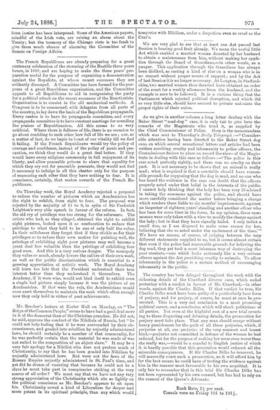The country has been deluged throughout the week with the
sickening details of the Crawford divorce case, which ended yesterday with a verdict in favour of Mr. Crawford,—in other words, against Sir Charles Dilke. If that verdict be true, Sir Charles Dilke must have been guilty of a particularly base form of perjury, and for perjury, of course, he must at once be pro- secuted. This is a very sad conclusion to a most promising political career, and a conclusion which will shock politicians of all parties. Yet even at the frightful cost of a new trial revert- ing to these disgusting and debasiug details, the prosecution for perjury must take place. That any man should escape without heavy punishment for the guilt of all these perjuries, which, if perjuries at all, are perjuries of the very meanest and basest kind,—perjuries not committed in defence of the woman he had seduced, but for the purpose of making her seem even worse than she really was,—would be a scandal to English justice of which it is hardly possible that this generation would exhaust all the miserable consequences. If Sir Charles Dilke be innocent, he will assuredly court such a prosecution, as it will afford him by far the best means he could have of testing the evidence against him in the manner most favourable to his own acquittal. It is only fair to remember that in this trial Sir Charles Dilke has not been represented by his own counsel, but has had to rely on the counsel of the Queen's Advocate.


































 Previous page
Previous page